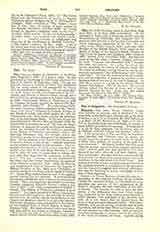

Day, GEORGE, Bishop of Chichester; b. in Shropshire, England, c. 1501; d. August 2, 1556. He was graduated at Cambridge in 1520-1 and admitted Fellow of St. John’s, September 19, 1522. Though apparently always a Catholic in belief, Day submitted like too many others to the assumption by Henry VIII of ecclesiastical supremacy. He was made Master of St. John’s in 1537, Vice-Chancellor of the University, and Provost of King’s College (though not a fellow of it) by special exercise of the royal authority, in 1538. Consecrated Bishop of Chichester in 1543 by Cranmer, he firmly opposed the spread of the Reformation under Edward VI. He answered in a Catholic sense Cranmer’s written questions on the “Sacrament of the Altar”, defended the Catholic doctrine in the House of Lords, and voted against the bills for Communion under both kinds, and for the introduction of the new Prayer Book. In his own diocese his preaching was so effective that, in October, 1550, the Council felt it necessary to send “Dr. Cox, the king’s almoner, to appease the people by his good doctrine, which are troubled through the seditious preaching of the Bishop of Chichester and others”, and, in the following December, Day was brought before the Council to answer for his disregard of an injunction to have “all the altars in every church taken down, and in the lieu of them a table set up” himself preaching on the occasion, if possible in his cathedral. After repeated interrogations, his final answer was that “he would never obey to do this thing, thinking it a less evil to suffer the body to perish than to corrupt the soul with that thing that his conscience would not bear”. For this “contempt” he was imprisoned in the Fleet, and after further questionings was deprived of his bishopric in October, 1551. From the Fleet he was transferred in June of 1552 into the keeping of Bishop Goodrich of Ely, then Lord Chancellor, in whose custody he remained until the death of Edward VI. Queen Mary restored him at once to his dignity, besides naming him her almoner. In reestablishing the ancient worship she had, however, to proceed cautiously. Thus contemporary chroniclers record that Cranmer conducted Edward’s funeral “without any cross or light”, and “with a communion in English”, though “the Bishop of Chichester preached a good sermon”. Day again preached at Mary’s coronation. His previous sufferings prove the sincerity of his conversion from the schism, and his reconciliation to the Church had doubtless already been privately effected. His formal absolution and confirmation in his bishopric by Cardinal Pole, as Papal Legate, is dated January 31, 1555. His death occurred only a year and a half later and he was buried in Chichester cathedral.
G. E. PHILLIPS

